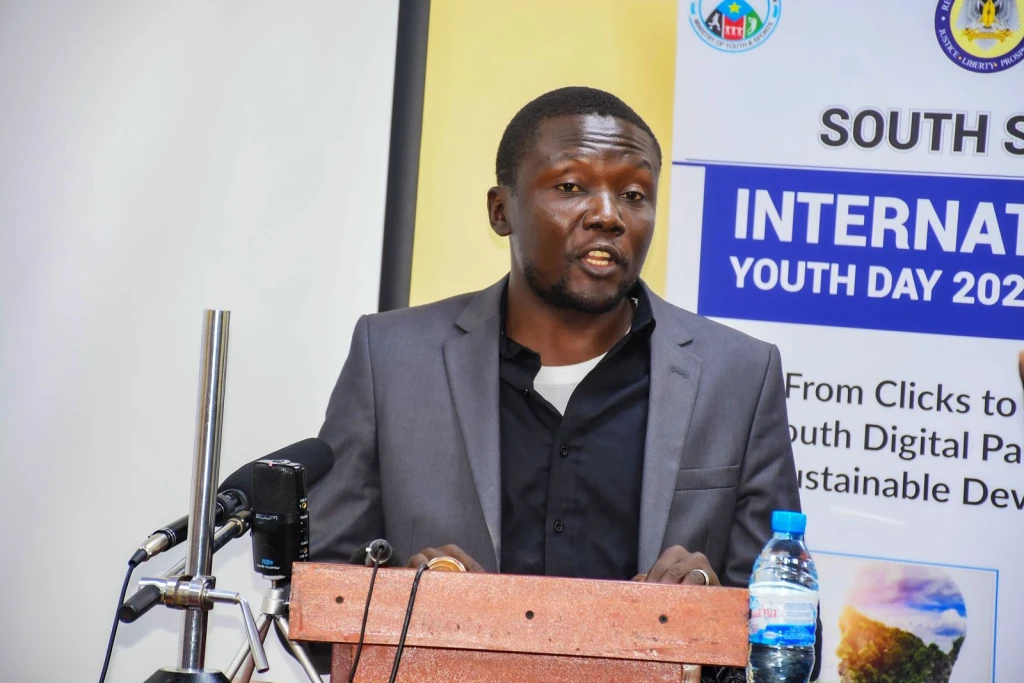
The South Sudan National Youth Union has proposed a ban on Facebook in South Sudan due to concerns over monetization.
During a press conference marking the commemoration of International Youth Day 2024 on Thursday, Emmanuel William Atit, Secretary General of the South Sudan National Youth Union, claimed that Facebook is profiting from South Sudan without providing any benefits in return.
He suggests that it should be banned in South Sudan.
“What is the country benefiting from Facebook because it is only the Facebook company that is benefiting from us, and what is the ministry of information benefiting? We can ask them that, in order for us not to close Facebook from South Sudan, they have to pay us yearly for Facebook and other social media to work within the territory of South Sudan,” said Atit.
“The same thing Uganda is doing, Facebook had to pay them for it to work in Uganda. We also need it to be applied here.”
The theme of this year’s International Youth Day is “From Clicks to Progress: Youth Digital Pathways for Sustainable Development.”
Atit stated that despite social media applications not being monetized in South Sudan, they have been widely misused by young people to spread hate speech.
He requested that the government ban these sites in South Sudan.
“I would like to request from the ministry of information, together with the ministry of youth, that there are some websites that need to be closed and blocked because they are the ones destroying our young men and women. Instead of them using it to educate themselves, they are using it for unnecessary things,” Atit claimed.
This year’s theme emphasizes the role of digital technology in empowering youth to drive sustainable development, transforming their online activities into meaningful progress for a better future.
However, online content creators from South Sudan are unable to make money because the online applications are not monetizing in South Sudan, leaving content creators with many questions.
“I’m one of the digital content creators in South Sudan; I’m asking the ministry of information, what exactly prevents South Sudan from being a YouTube partner?” Hakim Majok Barkuei, South Sudan content creator, said.
According to the South Sudan National Communication Authority, South Sudan lacks a Community Standards agreement with major platforms such as Meta, Google, TikTok, and Twitter (X).
Additionally, the country lacks comprehensive data protection and intellectual property laws, which are essential for content providers to safely operate and monetize their content.
"Those networks, before they can monetize material generated from anywhere, first have to agree with those people in that country for a community standard," said Napoleon Adok Gai, Director General of the National Communication Authority, on March 15, 2024, during the 4th Edition of Connecting South Sudan.
"It is important to have an agreed upon community standard. A community standard is beneficial for you, the content creator; it protects your intellectual property. For example, if you produce a video, make sure that your video is not plagiarized. These are things that are adopted in the community standard of a country."
Jacob Maiju Korok, Deputy Minister of Information, Communication Technology, and Postal Services, said the data protection law is being enacted to address the legal issues attached to online monetization.
“We have a data protection law that will be tabled before the council of ministers and the parliament. If that is passed, we will be able to create content and earn something,” Maiju stated.
“Your data is not really protected by law. So, we need to first legalize and pass the law, and then you will be given a room to create your content and make money.”
The deputy minister also revealed that the government has established an online surveillance team comprising national security, cyber security, and child protection officers to monitor online communication across the country.
“We established what we called a computer-immediate response team based on the national communication authority. This month, we will officially launch it. It will track and protect all the content, and it will also protect against misinformation and disinformation,” Maiju revealed.
“We see that on social media, many people are verified against people, talking rubbish against people. This team will monitor everything you do.”